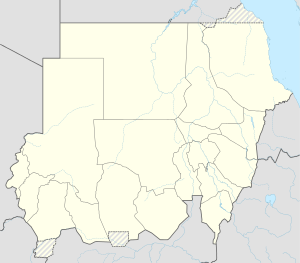Wad Habuba Revolt
| Wad Habuba Revolt | |||||||
|---|---|---|---|---|---|---|---|
| Part of the aftermath of the Mahdist War | |||||||
| |||||||
| Belligerents | |||||||
|
|
| ||||||
| Commanders and leaders | |||||||
|
|
| ||||||
| Strength | |||||||
|
|
| ||||||
| Casualties and losses | |||||||
|
|
| ||||||
The Wad Habuba Revolt (Arabic: ثورة ود حبوبة) was an uprising in Anglo-Egyptian Sudan in mid-1908. Its causes laid in religious opposition to Christian British rule in Sudan, and a desire to restore the Mahdist State. It was led Mahdist War veteran, Abd al-Qadir Muhammad Imam Wad Habuba. It began in April, when al-Qadir took over the town of Tugur with 40 followers. From there, the rebellion spread to Katfia. Colonial authorities took the revolt very seriously and dispatched 2 infantry companies to quell the uprising. By the end of April, Katfia had been bloodlessly recaptured. On the night of 2 May, the rebels attempted to retake Katfia from the British, but were unsuccessful, with 35 of them killed in the battle, while the British forces, led by Ernest Arthur Dickinson[2] (b. 1864,[3] Governor of Blue Nile province 1905–1914[3]) suffered 17 killed and wounded.[2] By 3 May, the revolt had ended and al-Qadir had left for Omdurman on a donkey.[2]
References
- ^ "Katfia, Safia & Katfia, Sudan". Google Maps. Retrieved 10 December 2019.
- ^ a b c Ibrahim, Hassan Ahmed (1979). "Mahdist Risings against the Condominium Government in the Sudan, 1900-1927". The International Journal of African Historical Studies. 12 (3): 440–471. doi:10.2307/218413. ISSN 0361-7882. JSTOR 218413.
- ^ a b Crichton-Harris, Ann (2009). Poison in Small Measure: Dr. Christopherson and the Cure for Bilharzia. BRILL. ISBN 978-90-04-17541-9.

